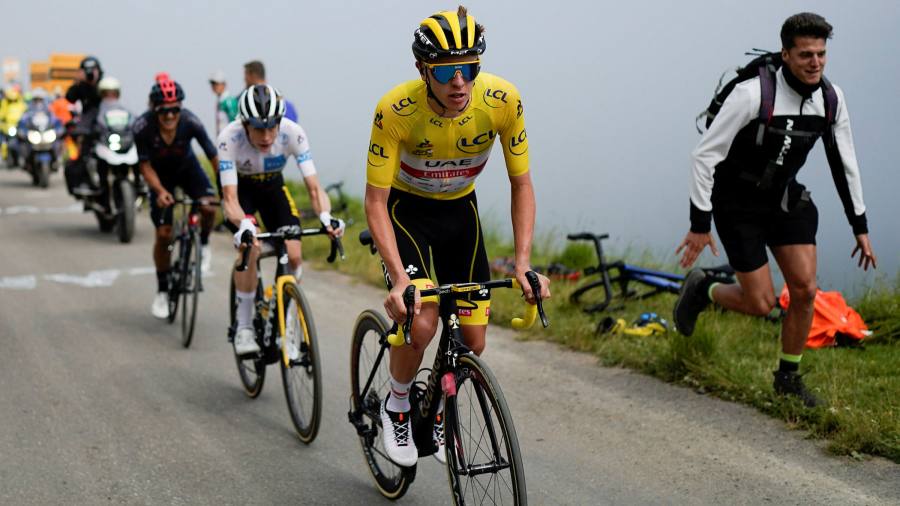Cycling prodigy takes Slovenia to the top of professional cycling
[ad_1]
The Slovenes hope to celebrate their country’s second Tour de France victory in two years when the race concludes on Sunday on the Champs-Elysees in Paris, as the tiny Balkan country continues its unlikely dominance of professional cycling.
Tadej Pogacar, the 22-year-old prodigy who rides for UAE Team Emirates, has tightened his grip on the yellow leader’s jersey with superb back-to-back wins in the Alps this week, and is on course to retain the title he won in 2020 His compatriot Primoz Roglic was forced to abandon the race due to injury, but remains world number one.
How Slovenia, which has a population of just over 2 million and celebrated 30 years of independence from the former Yugoslavia last month, came to dominate professional cycling can be attributed to a long passion for the sport, an investment in time and mountainous terrain – plus talent, hard work and an element of luck.
Pogacar’s victory in the world’s most prestigious and grueling cycle race would put the focus back on sporting feat after a tour overshadowed by crashes, including the shocking day one stacking caused when a rider cut a sign held by a spectator who was looking at him otherwise, resulting in several injuries and takedowns.
© Tim van Wichele / AP
This year’s Tour de France was also marked by the triumphant return of Mark Cavendish, the British sprinter who equaled the record of 34 stage victories held by legendary Eddy Merckx.
Pogacar, a product of the Slovenian cycling system, was destined for success from an early age, while Roglic, 31, was a laggard in the sport after starting out as a professional ski jumper.
Roglic became the first Slovenian to win one of cycling’s three grand tours when he won the Vuelta a España in 2019, defending it the following year. He was the favorite of the Tour de France 2020 when Pogacar claimed a surprise victory.
The pair are part of a deeper pool of Slovenian cycling talent that also includes Urska Zigart, Pogacar’s girlfriend who races for Team Bike Exchange.
Gorazd Stangelj, a former Slovenian runner and sporting director of the Bahrain Victorious team, admitted that it was “not easy” to explain the sudden dominance of Pogacar and Roglic, but that it was a reward for the efforts and talent.
The hunt for sports stars begins in schools and cyclists ride in the same teams from the junior to under 23 level up to the elite level, building strong bonds and team spirit, he said.
Slovenians also love sporting vacations, he explained, loading bikes and canoes into their cars when they go on vacation. Last year, the country established a national sports day.
“There is a lot of luck but we have also worked consistently for years and years,” said Stangelj, adding: “To have these runners in such a small country is a miracle.”
Pavel Mardonovic, President of the Slovenian Cycling Federation, said cycling clubs and supportive parents have played a role in Slovenia’s success.
“A few years ago, no one expected the Slovenes to achieve such incredible results as winning the Vuelta and the Tour de France, being number one and two in the world,” he said, but “success brings more success”.
Igor Evgen Bergant, Slovenian TV host and cycling enthusiast, highlighted the country’s strong cycling traditions and a long-standing preference for individual sports, especially gymnastics. In Slovenia, he said, “sport was accessible to all and very egalitarianâ€.
The proximity to Italy, a nation steeped in cycling history, and membership of the EU since 2004 also benefit Slovenian riders, many of whom speak and train in Italian.
Slovenia’s success shows how cycling is opening up beyond the traditional countries of Western Europe which are synonymous with the sport. Egan Bernal became the first Colombian to win the Tour de France in 2019, the year before Pogacar won.
“The cycling pool just got bigger and bigger,†said Richard Moore, co-host of The Cycling Podcast. “It is no longer dominated by four or five Western European countries.
Tine Mahkovec, co-owner of the Bikehanic repair shop in Ljubljana, the Slovenian capital, said that the success of his compatriots was not only a source of pride, but also a source of business.
Sales were already strong during the coronavirus lockdown as people had more free time and were looking to avoid public transport, “then the Tour de France came in, we were first and second and that pushed everything beyond of the limit. The bicycle shops were literally empty and the trend is expected to continue. Pre-orders for 2023 and 2024 are not uncommon. “
Mahkovec continued: “We used to say ‘if you don’t ski you are not Slovenian’, but that is changing. Now it’s ‘if you don’t have a bike you’re not Slovenian’. Everyone rides a bicycle.
[ad_2]

